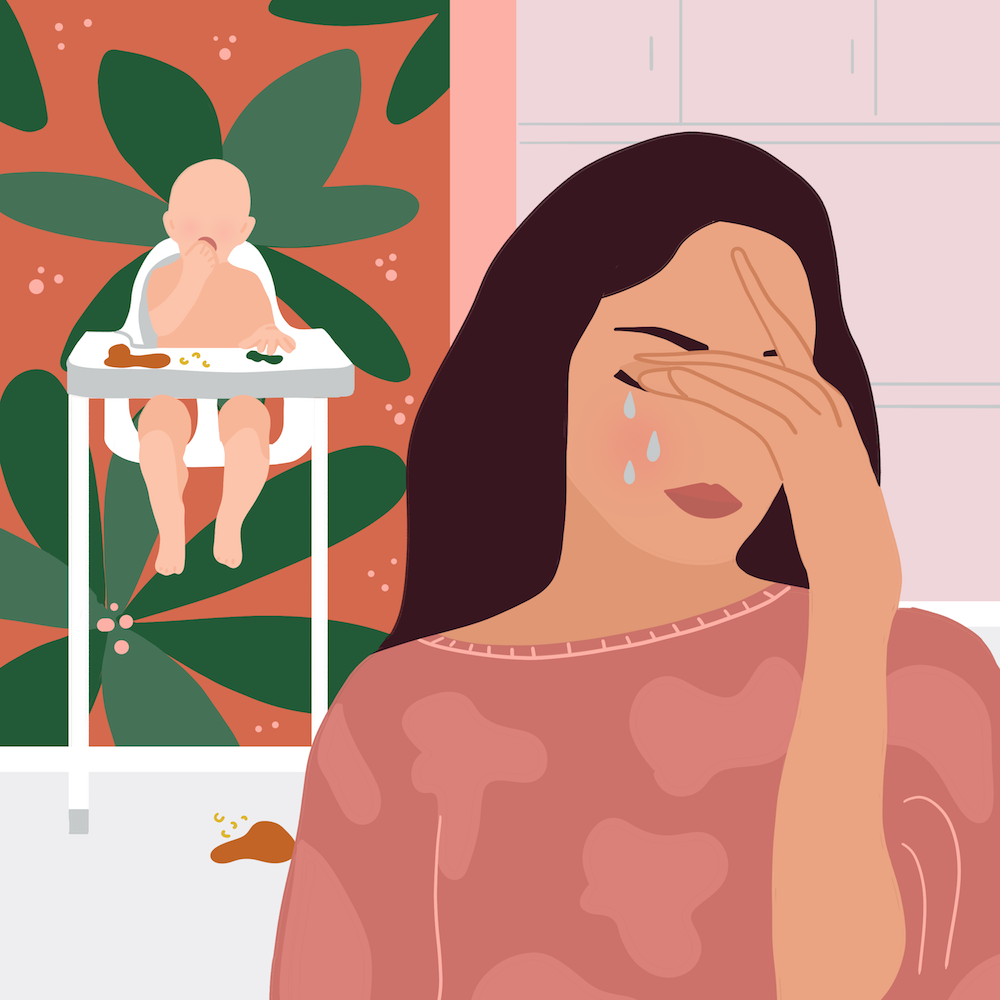Post-Weaning Depression Is a Thing, And It's Time We Start Talking About It

Rebecca Hart
Two months after she stopped breastfeeding her daughter, MacKenlee, digital influencer Angela Lanter started experiencing some unpleasant symptoms.
"It began with insomnia for me," says Lanter. "I first saw my ob-gyn and had her test my hormones since I was having night sweats every night."
Aside from her progesterone and estrogen being a little low, Lanter's results came back normal. But then, after going several weeks without a full night of sleep, she took an over-the-counter sleep aid one night and woke up at 2 a.m. with her first panic attack. "It was terrifying," recalls Lanter.
The next day, Lanter visited her primary care physician. She listed her symptoms, which also included nervous feelings and weight loss, and her doctor made a connection. "He immediately recognized that I was experiencing delayed post-weaning depression because his own wife had experienced it," says Lanter, who is married to actor Matt Lanter.
While she was relieved to hear her symptoms were connected to a medical condition, Lanter was also shocked: She had never heard the term post-weaning depression before.
"This has to be fake, right? Nope. It's a real thing. And turns out it's something that we women aren't talking about enough," she wrote in an Instagram post where she shared her experience with her more than 265,000 followers.
Lanter quickly learned other women could relate to her struggle. "So many moms have reached out and let me know that they too experienced to at least some degree what I've been going through," she says. Fellow moms have also commented on her post to talk about their own experiences, including some who, just like Lanter, didn't know anything about post-weaning depression.
What is post-weaning depression?
Post-weaning depression is a term used to describe depression that can occur after a woman stops breastfeeding. It can come as a result of hormonal fluctuations and/or the psychological stress of weaning.
Symptoms may include "increased irritability, teariness, loss of pleasure in a usually pleasurable activity, fatigue [or] trouble concentrating," says Gail Saltz, M.D., an associate professor of psychiatry at the New York–Presbyterian Hospital, Weill Cornell Medical College in New York City.
Why does post-weaning depression often go undiagnosed?
Lack of monitoring
Post-weaning depression doesn't get its fair share of attention—and there's little research on the condition. That may have something to do with the fact that moms aren't always closely monitored for depression at the time of weaning, says David Goldstein, M.D., an ob-gyn based in Philadelphia.
Most new mothers are screened on the Edinburgh Postnatal Depression Scale at their postpartum visits, and their ob-gyn typically discusses possible symptoms of postpartum depression and anxiety at that time. But this happens at around six weeks postpartum, and many moms wean much later (some after their child's first birthday).
"I've had patients who have experienced severe post-weaning depression," says Dr. Goldstein. And most of the time, his patients have no idea why they are having symptoms of depression. "Sometimes there's an aha moment when you bring it to their attention," he says.
Hormonal shifts
We may also be underestimating the hormonal shifts associated with weaning. "Oxytocin, which [rises] during breastfeeding, decreases with weaning," says Dr. Saltz. "This being the bonding, feel good hormone means a woman may miss the oxytocin good feelings and experience a more intense sense of loss and sadness."
Other hormones play a role, too. Prolactin, which is typically elevated during breastfeeding, is associated with feelings of calm. "An abrupt decrease in this hormone, when abrupt weaning occurs, can cause [bad feelings as well]," explains Dr. Saltz.
In the meantime, estrogen generally remains lower during breastfeeding and returns to pre-pregnancy levels after weaning. For some women, this happens at slower rates. "Shifting estrogen levels causes depressed or irritable mood for some women," adds Dr. Saltz.
Can happen later on
Another problem? Post-weaning depression doesn't always set in right after a mom stops breastfeeding. Because of that, it's likely that some moms are going through it without ever connecting their symptoms to the weaning process.
"Women often do not reveal they have these feelings or don't realize that [post-weaning depression] is what they are experiencing," says Dr. Saltz. In turn, she adds, post-weaning depression remains less familiar for the psychiatric community than other postpartum conditions.
When to seek help
Some sadness and a feeling of loss may be normal during the weaning process—but if you feel like something larger may be at work, experts recommend seeking help. "If the symptoms become severe enough to interfere with Mom's ability to function, if she has thoughts of suicide, if she has trouble taking care of herself and baby, if she has difficulty sleeping or has loss of appetite, then this is more severe and requires evaluation and treatment," says Dr. Saltz.
Moms who are dealing with any of these symptoms can get in touch with a mental health professional, general physician, or ob-gyn, who will help determine the best course of treatment. That may include therapy, medication, or supplemental hormones.
And know you're not alone—even if your symptoms or their timeline don't fit the commonly painted picture of maternal mental health issues.
"Don't suffer in silence," says Lanter, who sought out counseling and is now taking the antidepressant Lexapro. "Go to your doctor. Talk to your spouse, family, and friends. Seek out counseling. You will get better, but in the meantime, you do need support."

